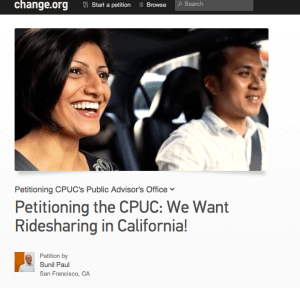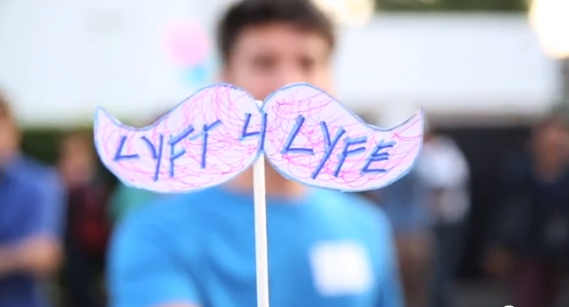California
Meanwhile, in California, ridesharing companies face the biggest opposition from a state regulatory agency, the California Public Utilities Commission (CPUC).
Earlier this week, I caught up with Emily Castor, Lyft’s first community manager, to discuss a recent Change.org petition to bring ride-sharing services — Lyft, Uber, and Sidecar — to Los Angeles, a battleground for ride-sharing startups.
That particular Change.org petition was signed by over 11,000 people, many of whom wrote about negative experiences with local cab companies.
“We saw this petition surface and then it caught traction so quickly,” said Castor. “I think that was really key for us in getting the attention of the mayor of Los Angeles [Eric Garcetti].”
With the support of the community, Lyft has been able to spread more quickly. The startup doesn’t need to “bear the brunt of the cost” to fight its opposition, as it has been able to “rely on its grassroots supporters,” Castor told me.
According to Castor, Change.org isn’t the only tool leveraged by the various ride-sharing services.
For instance, one L.A.-based mother started a blog to advocate for Lyft, as she views ride-sharing services as a far safer alternative to taxi cabs for her teenage daughters, and it took off on social media.
To rally the community, Lyft regularly hosts meet-ups in cities across the country. Community managers are encouraged to send out mass e-mail to thousands of customers, urging them to sign Change.org petitions and write to their local legislators.
Lyft’s team realizes that the pivotal moment for ride-sharing is now, in California, Colorado, and in the rest of the country. The CPUC is expected to vote on how it will govern ride-sharing apps in September after a year-long research process.

Above: A Change.org petition started by Sidecar cofounder Sunil Paul.
In anticipation of this vote, Sunil Paul, Sidecar’s CEO and cofounder, also launched a Change.org petition urging the PUC to support ride-sharing. It has already garnered over 4,500 signatures.
In the petition, Paul asks the regulatory body to withstand pressure from taxi companies, which intend to “maintain the status quo.” More accurately, these businesses are fighting for their own survival, in the face of threat from these new startups.
Sidecar investor Caldbeck said he’s confident that the PUC will rule in favor of ride-sharing services. He believes that the decision will “set a precedent” for other cities to follow.
A spokesperson from the San Francisco Municipal Transportation Authorities (SFMTA), the body that manages all transportation in the city, including taxi services, did not respond to repeated requests for comment.
The journey ahead
Regulatory hurdles aside, Lyft and Uber face a number of challenges as they continue to grow.
The biggest hurdle? Most Americans still haven’t heard of ride-sharing.
“We have an ambitious goals, and we know that,” Lyft’s Zimmer told me recently after announcing plans to spread across the country by 2014.
These services have taken off in the Bay Area, but you might argue that San Francisco is an anomaly, given the sheer number of startups and tech companies. San Francisco’s early adopters were easily won over by Uber’s fancy black cars and Lyft’s delightful pink mustache, but these tactics might not fly in Middle America.
In addition, many San Franciscans don’t have cars (this writer included), relying instead on public transportation and cab services. A few years ago, before the advent of services like Lyft and Uber, it was notoriously tricky to hail or order a taxi in parts of the city.
But even in San Francisco, the so-called “hotbed of transportation innovation,” ride-sharing has provoked strong resistance. In November, Lyft and Uber received a $20,000 fine and a cease and desist letter from the CPUC, which was later revoked. In recent months, I’ve seen local Lyft drivers habitually remove the mustaches from the hood of their cars to avoid a tongue lashing from pissed-off taxi drivers who feel they are losing business.
As ride-sharing made its way to cities like New York, Portland, and Austin, these services received lawsuit after lawsuit after lawsuit, cease and desist letters, and further citations.
Still, ride-sharing’s supporters say that the public will fight for these services. Zimmer said the Lyft team will “rally the troops if need be.”
“Regulatory agencies aren’t accustomed to dealing with the public when it comes to policy decisions,” Castor agreed. “But they can’t ignore the weight of all these voices speaking in unison.”


